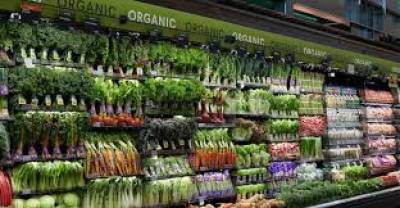NEW DELHI, 30 April 2024: The global organic food market is flourishing, driven by a growing awareness of health and environmental concerns. This presents a golden opportunity for Indian farmers to tap into this lucrative market by cultivating organic produce in high demand internationally.
This report explores the top 10 organic products with strong export potential, analyzes the current state of organic farming in India, and examines the challenges and government policies supporting this promising agricultural revolution.
Top 10 Organic Produce for Export Glory
Indian farmers have a diverse range of options to consider when venturing into organic exports. Here are the top 10 organic products with high international demand:
- Quinoa: This protein-rich superfood is a global favorite, and organic quinoa fetches premium prices. India's diverse climate allows for cultivation in several regions.
- Basmati Rice: Renowned for its aroma and long grains, organic Basmati rice enjoys a strong reputation in international markets.
- Spices: Cardamom, cloves, turmeric, and other Indian spices are highly sought-after in organic form. Focusing on organic certification can significantly enhance their export value.
- Pulses: Organic lentils, chickpeas, and other pulses are gaining popularity as a healthy and sustainable protein source. India's position as a leading pulse producer makes it a natural contender in this market.
- Dried Fruits and Nuts: Organic raisins, cashews, almonds, and other dried fruits and nuts are popular healthy snacks with a strong global demand.
- Fresh Fruits: Organic mangoes, grapes, pomegranates, and other exotic fruits can fetch premium prices in international markets, particularly in off-seasons for those countries.
- Honey: Organic honey, known for its purity and unique flavor profile, is a sought-after product. India's diverse flora offers a rich variety of organic honey options.
- Coffee: Organic coffee beans command premium prices due to their superior taste and sustainable production methods. Indian coffee estates can leverage their reputation by going organic.
- Tea: Organic Darjeeling and Assam teas are renowned worldwide. Emphasizing organic certification can further enhance their export potential.
- Herbal Products: India's rich tradition of Ayurveda offers a vast array of medicinal herbs. Cultivating and exporting organic versions of these herbs can cater to the growing global interest in natural remedies.
The Organic Journey: How Many Have Embraced the Change?
As of 2023, estimates suggest that over 1.8 million hectares of land in India are under certified organic cultivation. While this number is steadily growing, it still represents a small portion of India's total agricultural land. Encouraging wider adoption of organic farming practices is crucial for realizing the full potential of organic exports.
Challenges on the Path: Hurdles for Indian Organic Farmers
Despite its promising future, Indian organic farmers face several challenges:
- Limited Infrastructure: The infrastructure for organic processing, storage, and transportation needs significant improvement to ensure efficient export operations.
- Market Access: Connecting small-scale organic farmers with reliable international buyers remains a challenge.
- Certification Costs: The certification process can be expensive and time-consuming for small farmers, deterring them from entering the organic market.
- Lack of Awareness: Spreading awareness about organic farming practices and the benefits of organic produce among both farmers and consumers is crucial for wider adoption.
Government Policies: Nurturing the Organic Dream
The Indian government recognizes the potential of organic farming and actively promotes it through various policies:
- National Mission on Sustainable Agriculture (NMSA): This mission provides financial assistance for organic certification, promoting farmer adoption of organic practices.
- Paramparagat Krishi Mission (PKM): This scheme focuses on promoting traditional and organic farming practices across the country.
- Schemes for Organic Farming Infrastructure: The government offers financial support for infrastructure development related to organic processing, storage, and marketing.
- Organic Farming Export Promotion Programmes: Initiatives like the Agricultural and Processed Food Products Export Development Authority (APEDA) help connect organic farmers with international markets.
A Sustainable Future on Organic Ground
The organic farming revolution presents a win-win situation for Indian farmers, consumers, and the environment. By focusing on high-demand organic produce, overcoming logistical challenges, and leveraging government support programs, Indian farmers can become leading players in the global organic food market.
With a collective effort towards sustainable agriculture practices, India has the potential to cultivate a brighter future, not just for itself but for the global food chain. By building robust infrastructure, fostering market access for small-scale farmers, and promoting consumer awareness, India can translate the promise of organic farming into a flourishing reality.
Image credit: supermarketnews.com























